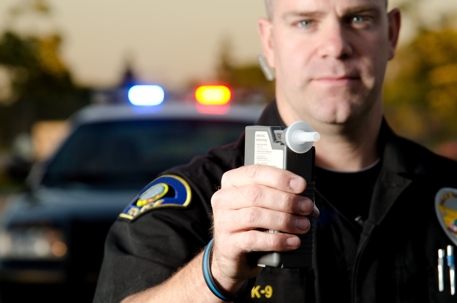We are asked numerous times (sometimes in the middle of the night) if I should blow when there is a suspicion of a person driving while impaired. To answer this question, we need to take a deep dive into the different situations in which a person would be asked to blow.
Detection Stage by Officer (Roadside):
If you have viewed our previous article (Standard Field Sobriety Tests) you will see that Officers and Troopers use a number of detection tests to determine if there is probable cause to arrest someone of a DWI.
One major part of their system is to use a PBT (preliminary breath test) or ASTD (alcohol screening test device) after a number of tests have already been performed on the person. These devices are used to demonstrate an association with alcohol along with observable evidence which helps establish probable cause for a DWI arrest.
Now, in North Carolina DWI cases, the hand-held device is called the AlcoSensor FST. That device does give a numerical reading of how intoxicated a person is...but the numerical reading/display is NOT the purpose of that device. The main purpose (which can seem tricky to a common person) is just to determine if there is a positive or negative reading of alcohol. In court, the numerical value cannot come into court; however, the positive or negative reading can.
It is important to understand, refusing the roadside breath test is a person’s right and refusing the test does not bring about any consequences to your driver’s license. If there is a suspicion of a DWI, officers will try to gather all the evidence pertaining to that suspicion.
On the other hand, if you decide not to blow into the hand-held device, the officer is allowed to testify that you did not blow. Therefore, the judge presiding over the case may or may not use that as one of the determining factors in establishing probable cause.
Evidentiary Breath Sample (Arrested and Taken to Station):
The Intox EC/IR II is used (with a high degree of scientific certainty) to determine what numerical value is your BAC or blood alcohol content. As you know or have figured out while reading this, a person commits the offense of impaired driving by driving after having consumed sufficient alcohol that he or she has, at any relevant time after the driving, an alcohol concentration of .08 or more. Moreover, the state of course must demonstrate that at least .08 of a person’s alcohol concentration was based on alcohol consumed before or during the driving (which can be difficult if consumed after driving).
The EC means electrochemical cell and the IR means infrared energy absorption. Now, that does not play a part into your defense of a DWI but it is important to know how these machines operate.
Before the officer asks to blow into the machine, he or she will lay out the implied consent form. Also, the officer must observe a person before blowing for a minimum of fifteen minutes to determine that the person has not ingested alcohol or other fluids, regurgitated, vomited, eaten, or smoked.
What if I refuse to blow in this machine also? The first thing you must do is contact an attorney to determine to best attack plan. However, there are consequences in refusing. The three main consequences include:
- Civil Revocation of Driver’s License
- This means that the DMV, through the State of North Carolina, can revoke your driver’s license for up to 30 days from the day you refused the test. Once that happens, you can either:
- Apply for a limited driving privilege after 10 days of the civil revocation being in place.
- Request a hearing to fight the revocation.
- Do nothing at all and allow the 30 day revocation period to expire (meaning you do not drive for 30 days and allow the expiration period to expire). In order to get your license back, you need to wait the 30 days and pay $100.00 revocation fee. If caught driving during the 30 day period, it could lead to severe criminal charges.
- This means that the DMV, through the State of North Carolina, can revoke your driver’s license for up to 30 days from the day you refused the test. Once that happens, you can either:
- DMV, through the State of North Carolina will revoke your driver’s license for 1 year
- In order for this to happen, the officer must file an affidavit with the DMV explaining that you refused the test and DMV should revoke your license.
- At that point, NC DMV will send a letter to the address listed on the driver’s license (that is why it is important to have an update driver’s license) explain that they are revoking your driver’s license. Now, it is important to know that you can request a hearing to fight the revocation but the window to request a hearing is very short. It is important to NOT waive your right to a hearing and have the suspension take effect.
- Use the refusal against you at trial
- Along with the roadside breathalyzer test, the State has the right and burden to use the fact that you refused the tests against you at trial. The State will try to draw the inference that because you did not consent to blowing into any machine, gives rise to the presumption that you are hiding something. The something is that you were over the legal limit while driving.
It is important to know that these consequences are complicated to maneuver. There are ways to fight for your rights so these consequences do not come about. However, it is extremely important to consult with an attorney prior to taking these situations on by yourself.

